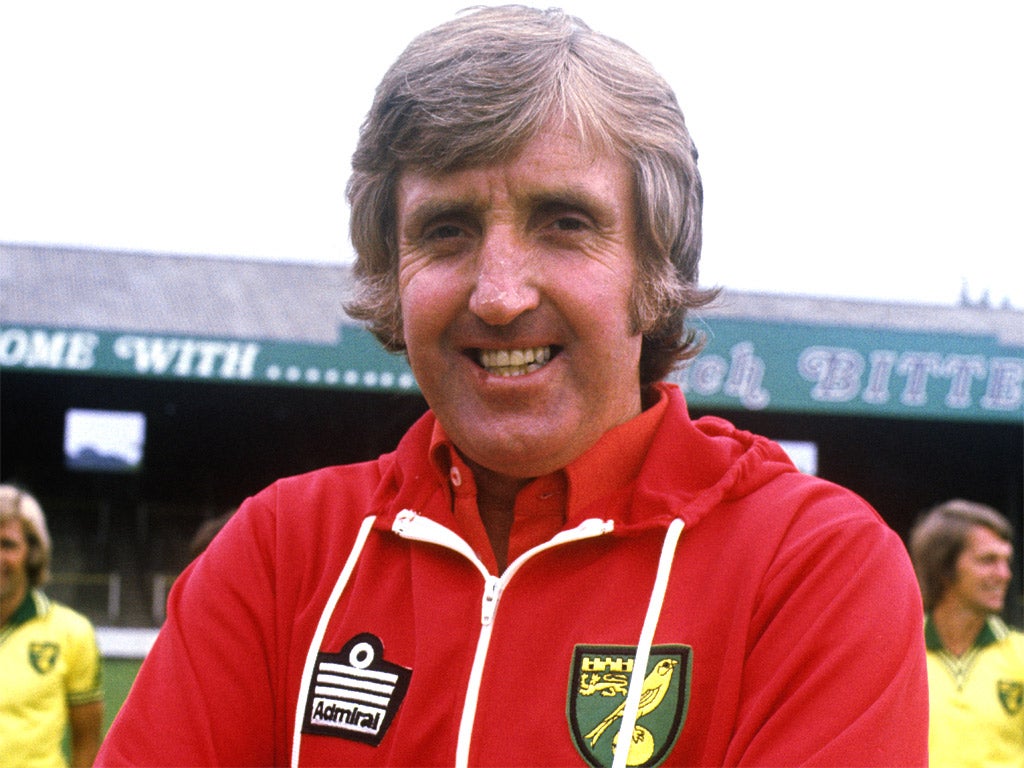John Bond: Colourful footballer and manager
A powerful striker of the ball, he was known as 'Muffin', after the hard-kicking television mule

John Bond believed that football should wear a smile on its face, a personal creed he embraced passionately and entertainingly throughout colourful careers as both player and manager. First he was a talented, engagingly flamboyant, long-serving full- back with West Ham United, and could consider himself unfortunate, perhaps, never to receive a full England cap. Then, having thrown himself into coaching with characteristic enthusiasm, he spent a quarter of a century as an imaginative, often outspokenly opinionated boss, serving seven clubs, most conspicuously Norwich City and Manchester City.
Hailing from rural Essex, the teenage Bond was delivering pies in 1949 when he heard the Second Division Hammers wanted to sign him. He turned professional in 1950, underwent conversion from centre-forward to flank defender and made his senior debut in 1952. Bond settled on the right, by mid-decade cementing a regular berth in Ted Fenton's attractive but inconsistent side, relishing his role alongside such innovative football thinkers as Malcolm Allison, Noel Cantwell and Dave Sexton.
The intelligent Bond was never over-physical, preferring canny interceptions to neck-or-nothing challenges and he was skilful. Whether delivering accurate passes or thrashing free-kicks and penalties towards opposition nets, he was a crisp and powerful striker of the ball, nicknamed "Muffin", after the hard- kicking mule of children's TV.
He was something of an affable extrovert, relishing a matey rapport with Upton Park regulars, whom he loved to thrill with audacious dribbles, delicate chips back to his goalkeeper and ambitious passes, all of untypical of full- backs of that era. Bond was also an effective emergency centre-forward, never more so than at home to Chelsea in 1960, when he plundered a hat-trick in a 4-2 win.
He was disappointed not to earn a place in England's squad for the 1958 World Cup finals. He ascribed his omission to a faux pas within the selectors' earshot, asking if the players could take a crate of beer to their rooms because a hotel bar was closed.
After missing much of 1962-63 following a disagreement with new manager Ron Greenwood – a man he later came to revere – Bond bounced back to feature alongside Bobby Moore, Geoff Hurst and Martin Peters. After playing his part in the 3-2 injury-time victory over Preston in the 1964 FA Cup final, he missed the European Cup-Winners' Cup triumph of 1965.
He joined Torquay United in January 1966, just in time to help win promotion to the Third Division. Bond remained at Plainmoor until 1969, then coached Gillingham briefly before entering management with Bournemouth in May 1970.
At Dean Court he revitalised an ailing club which had just descended to the basement tier, guiding them to the runners-up spot in his first campaign, and drawing a 49-goal contribution from Ted MacDougall. He stepped up to top-flight Norwich, replacing Ron Saunders in November 1973. Although it proved too late to avert relegation, in 1974-75, fortified by the procurement of MacDougall, his former Bournemouth strike partner Phil Boyer and England World Cup hero Peters – City returned to the top flight, and also reached the League Cup final, in which they lost 1-0 to Aston Villa.
Bond established Norwich as solid mid-table citizens for most of the rest of the decade, developing outstanding young players such as Kevin Reeves and Justin Fashanu before taking the place of his old pal Allison at Manchester City in October 1980. He started boldly, buying Tommy Hutchison, Gerry Gow and Bobby McDonald, and by springtime he had guided his new charges to a position of First Division comfort and the last four of the League Cup.
The season's highlight, though, was the FA Cup final against Tottenham from which City, with a little luck, could have emerged triumphant. However, after looking the better team in a 1-1 draw they were beaten 3-2 in the replay thanks to a scintillating individual goal by Ricky Villa.
Bond paid £1.2m to acquire Trevor Francis that summer and City topped the table in December, only to finish 10th. With chairman Peter Swales over-spending in his obsession to eclipse Manchester United, there was boardroom strife which handicapped the manager, yet he spurned an approach from Benfica at the outset of 1982-83. That term proved calamitous. After another bright start there was a slump, he resigned in February and the Blues were relegated.
Bond's career was firmly past its zenith. Next came a mid-table Third Division season with Burnley, whom he joined in June 1983; then an anti-climactic stint with penniless Swansea City, also of the third level, which ended with the sack in October 1985; and a miserable return to the top tier with Birmingham City, during which he presided over one demotion that term, and narrowly missed another.
He became Asa Hartford's assistant at Shrewsbury Town, taking over when Hartford was sacked in January 1991. He led them clear of relegation to the Fourth that season, only to go down a year later. Later Bond – whose son Kevin played for him at Norwich and Manchester City – had a stint with non-League Witton Albion and served Wigan Athletic as a consultant.
John Frederick Bond, footballer and manager: born Colchester 17 December 1932; married (one daughter, one son); died Manchester 25 September 2012.
Join our commenting forum
Join thought-provoking conversations, follow other Independent readers and see their replies
Comments